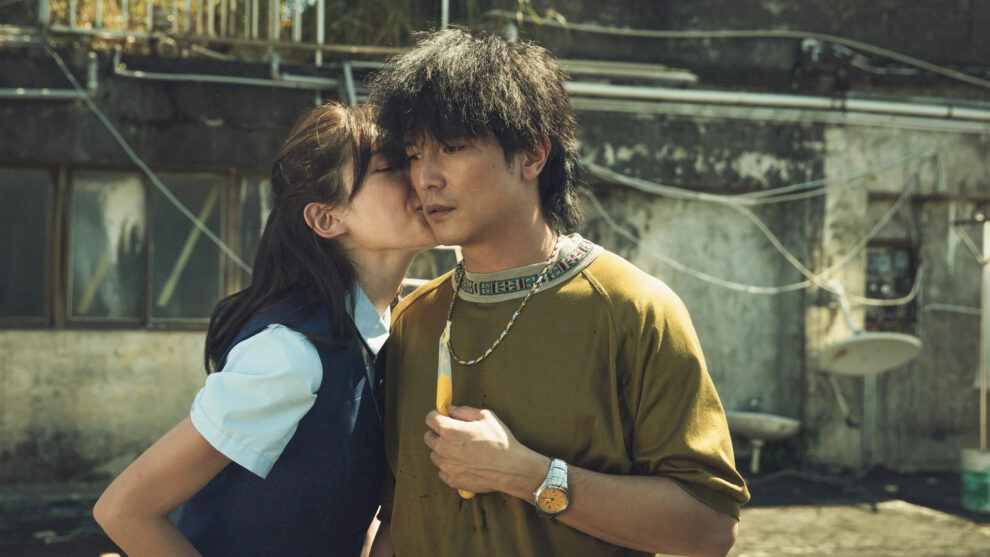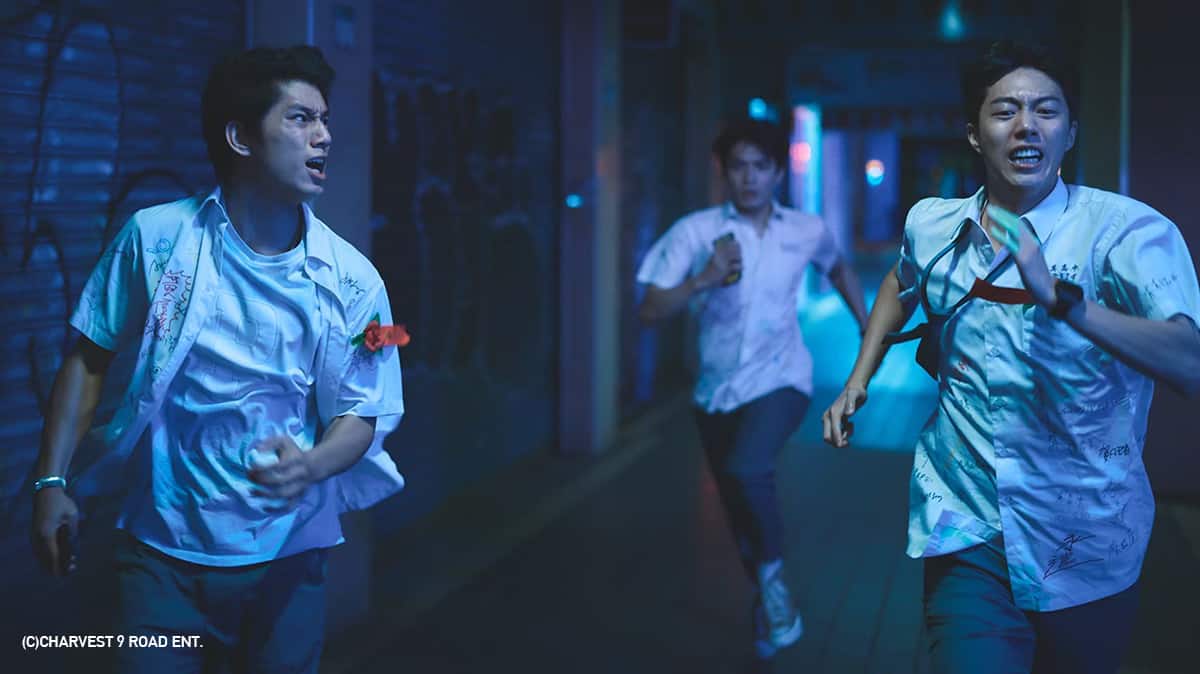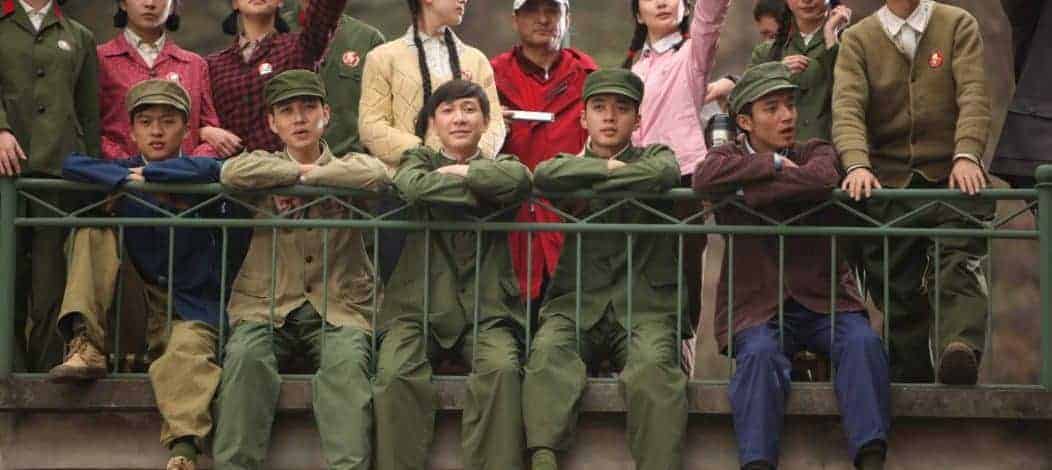Official remake of Han Dong-wook's 2014 homonymous film, “Man in Love” was also a success in Taiwan, retaining the number one spot in the local box office for three weeks, while netting the protagonist, Roy Chiu, a Best Leading Actor Award from the 23rd Taipei Film Awards. Also of note is that the second lead role is held by his wife, Tiffany Hsu.
A-Cheng is a violent debt collector with a good heart, which essentially means that he beats the people who try to antagonize him, but feels sorry for the ones who tell him of their problems and the reasons they cannot pay. This second aspect of him is frequently bringing him trouble with his boss, Madam Chai, who retains him on payroll, though, due to his force. A Cheng is living with his brother's family, who owns a barber shop, and also his father, but evidently, their relationship is not ideal. One day, while on his way to the hospital to get money owed by her father, he meets Hao Ting, and immediately gets in love with her, particularly after seeing her taking care of her ill father and realizing she is shouldering the debt on her own. Their “relationship” is expectedly bumpy, but A-Cheng fathoms a plan to get close to her, proposing a deal where he pays a part of her debt each time she goes out on a date with him. The girl initially declines, but realizing she has no chance of paying the debt and her father's medical costs, she reluctantly agrees. Gradually, she gets to know his good side and warms up to him. Happiness, however, is not that easy to achieve and violence sweeps A-Cheng once more.
The film is essentially split into two parts, with the aforementioned incident functioning as the dichotomy. The first part unfolds much like a romantic comedy with a bit of a violent twist, as we watch A-Cheng doing everything in his power to woo Hao Ting, including asking the help of the people he treated with kindness as a debt collector. The part is as entertaining as possible, with the two protagonists, Roy Chiu and Tiffany Hsu exhibiting an excellent chemistry, that benefits the most by their antitheses in every aspect: demeanor, appearance and line of work, since she actually works in a bank. Evidently, that he will eventually curve her resistance is obvious from the beginning, but the way Yin Chen-Hao gets to that point is a delight to watch, with the scene where she finally smiles and gets romantic with him being among the most memorable in the movie. Furthermore, the frequent music video-like sequences add even more to the entertainment and overall fun this part emits.
Check also this interview
On the other hand, the second part takes a distinct melodramatic turn, becoming both dramatic and violent, with A-Cheng's non-stop downward spiral and his fighting with essentially everyone around him dictating the narrative. It is in this part, and the ending of the first that the despicable role of Madam Chai is highlighted, while one of the main comments of the movie arises: that escaping your social “level” is probably one of the hardest things to do. The fact that A-Cheng keeps trying with the only way he knows, through violence, but continuously failing, even eventually experiencing a fate that could be perceived as punishment, is another message here, this time regarding the futility of brutality and the consequences of lying. A more subtle social comment derives from Hao Ting's life, who works in a bank (where all the money pass through) but never has money herself. One could also say the same for A-Cheng's life, although the way his story unfolds leads to other paths. Lastly, the confucianist values of always taking care of your parents is showcased in the story every chance the director can.
At the same time, though, and even if the movie ends on a somewhat optimistic note that shows that his actions were not without a positive impact, the second part is definitely much worse than the first. The melodramatic elements are excessive, the pace much slower, and fun is thrown out of the window, while the duration, that gets the movie to 115 minutes, can also be added to the negative aspects of the film. Lastly, the fact that the two protagonists do not spend that much time together, also takes its toll.
The acting is on a relatively high level, with Roy Chiu being the undisputable protagonist here, in the most demanding role of the film. Tiffany Hsu is quite good in the way she mellows towards her co-protagonist, with the way her mentality changes a number of times being impressive to watch. Zhong Xin Ling as Madam Chai is also quite convincing in the role of the unlikely, but also cunning and rather ambitious crime boss.
The cinematography of the film is also part of the entertainment, with Chen Chi Wen capturing the Taiwanese underbelly with gusto, with the coloring in particular helping the most in that regard. Chen Jun-hong's editing results in a fast tempo in the first part and a slower one in the second, which fits the narrative equally but still adds to the issues the latter face. The placement of the music video sequences however, is ideal.
“Man in Love” is an entertaining movie, benefitting the most by its cast and protagonist values. The way the quality decreases in the second part, probably in an effort to follow the omnipresent melodramatic tendencies of Korean cinema found in the original, costs the movie significantly. Still it deserves a watch, but can also be perceived as a missed opportunity for something much better.
















